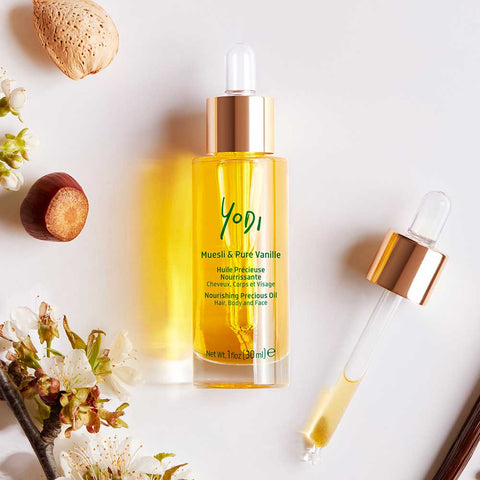A veritable treasure trove of nature, vitamin C or ascorbic acid is renowned in cosmetics for its anti-ageing antioxidant properties, which play a direct role in preventing skin ageing and improving its appearance. Acting as an immune system booster, it is also essential for the proper functioning of our body and our organism as a whole.
Discover its various effects on the skin and its many other benefits below!
Vitamin C: a super-active ingredient for beautiful skin
What is vitamin C?
A famous cosmetic active ingredient, vitamin C is originally a water-soluble vitamin that enables the production of collagen, a protein essential to the proper development of the body and the organism in general (water, calcium, minerals, bones, ligaments).
Did you know? Vitamin C does not occur naturally in the body! Humans are incapable of synthesizing vitamin C, and over time have lost the ability to produce the enzyme required for its production and storage. Vitamin C is therefore obtained from dietary sources such as citrus fruits and green leafy vegetables. However, oral absorption of vitamin C from the diet is fairly limited, and can lead to deficiency. In this case, supplementation with vitamin C supplements may be of interest. On the other hand, topical application (on the face) of cosmetic vitamin C in the form of a cream or serum, for example, is essential to take full advantage of its benefits and observe real results.
Vitamin C in cosmetics can be of synthetic or natural origin. The synthetic vitamin C found in most cosmetic skin care products is generally present in the form of L-ascorbic acid. It can also be found in the form of calcium ascorbate, magnesium ascorbate, sodium ascorbate, sodium ascorbyl phosphate, etc.
Naturally-occurring vitamin C is generally found in citrus fruits, berries and certain vegetables. It also contains powerful nutrients that make it incomparably potent. For this reason, a healthy, balanced diet rich in fruit and vegetables is essential for a natural intake of vitamin C and to avoid potential deficiency!
In terms of chemical structure, naturally-occurring vitamin C is similar to its synthetic counterpart. However, clinical studies show that naturally-occurring vitamins can be even more potent.
What is the role of vitamin C?
Vitamin C plays an essential overall role in the body, and more specifically in metabolism. As an antioxidant, it helps combat the risks of free radicals, which are aggressive to our skin and cells. These generate what is known as "oxidative stress". Vitamin C thus helps us maintain beautiful skin and a radiant, even complexion!
But its role doesn't stop there: it's also good for your health:
The role of vitamin C in health
Together with vitamin E, vitamin C fights free radicals produced by the body when subjected to external aggressions such as stress, pollution, tobacco, alcohol and UV rays, helping to protect the skin and slow down the aging process.
When the skin is exposed to this type of external aggression and stress, reactive oxygen species (ROS) are released. To protect itself from these ROS, the skin is equipped with a complex enzymatic and antioxidant system. Among these antioxidants is the famous vitamin C.
Vitamin C also acts on collagen production, which brings real results in terms of skin elasticity and the attenuation of signs of aging. Among other things, it promotes healing.
On the other hand, vitamin C helps the body, and more specifically the intestine, to better assimilate iron from food. So, once again, it helps to avoid the risks of a potential deficiency, followed by necessary supplementation in this area.
Finally, vitamin C plays an important role in the prevention of cardiovascular disease, helps eliminate liver toxins and improves overall immunity thanks to its action on the white blood cells present in our body.

Vitamin C in cosmetics
Vitamin C: a powerful antioxidant to combat ageing
Collagen production gradually declines as we age, playing a major role in skin slackening. On the other hand, factors such as sun exposure, stress or smoking can lead to a premature reduction in collagen production. This leads to the premature development of fine lines and wrinkles.
Vitamin C plays an essential role in collagen biosynthesis. In fact, it acts as a cofactor for enzymes capable of stabilizing collagen cross-linking. Vitamin C can also directly stimulate collagen synthesis and even preserve the collagen that exists naturally in our bodies.
Vitamin C: a powerful anti-inflammatory
In addition to its anti-aging properties, vitamin C is known to be a powerful anti-inflammatory. In fact, it acts by suppressing the activation of factors responsible for the production of pro-inflammatory cytokines. This is why topical application of vitamin C can be useful in the treatment of various inflammatory dermatoses, including post-laser application.
Vitamin C helps fight hyperpigmentation
Vitamin C can also act on the production of melanin, which is, in simple terms, the element responsible for our skin color.
Vitamin C helps combat sun spots, acne marks and even melasma, a skin condition characterized by the appearance of brown spots on the skin.
Natural protection from the sun's rays
Yes, vitamin C can also protect your skin from the sun! However, it's not a sunscreen and won't protect your skin like one. To be on the safe side, always apply sunscreen before exposure. Nevertheless, thanks to its antioxidant properties, vitamin C absorbs skin damage caused by UV rays. UV rays are responsible for the production of free radicals.

Fruits and vegetables rich in vitamin C
While it's true that taking vitamin C orally will have little effect on the skin, it's still essential for your health. Whatever the season, your skin and body always need vitamin C. It's THE essential booster. It's THE essential booster, so it's time for a good diet to protect our bodies from deficiency!
In winter, that's when we're most susceptible to infection. Consuming vitamin C-rich fruit and vegetables as part of our daily diet is therefore essential to boost our immune system, providing it with all the nutrition it needs. So go for vegetable soups!
Summer is all about delicious fruit: strawberries, papayas, cherries! But don't forget the vegetables: cucumbers, artichokes and avocados are your best friends!
Did you know? Oranges are not the richest fruit in vitamin C!
Yodi takes care of you and offers you a little dietary roundup with a list of the fruits and vegetables most concentrated in vitamin C. These are interesting in terms of nutrition and intake, and can help you avoid potential vitamin C deficiency!
Fruits:
- Guava
- Blackcurrant
- Lemon zest
- Kiwi fruit
- Lychee
- Red berries
- The strawberry
- Papaya
Vegetables:
- Yellow peppers
- Fresh parsley
- Red peppers
- Red cabbage
- Watercress
- Spinach

Did you know? It's advisable to eat fruit or vegetables raw to limit the loss of vitamin C content! And yes, vitamin C degrades when cooked, making it less interesting in terms of intake and nutrition for the body.
Serum, cream, dietary supplements: what form should vitamin C be used in?
Does it matter what form of vitamin C we apply to our skin? The answer depends on your skin type and your own tolerance to vitamin C!
To begin incorporating vitamin C into your routine, the ideal approach is to start with skin care products containing vitamin C derivatives, let your skin get used to them and then gradually move on to other, more concentrated products, as your skin develops tolerance. The most important thing for optimum effectiveness is to find the right dosage of vitamin C!
If your skin is sensitive, choose a cream containing vitamin C: it will be less concentrated and therefore better tolerated by the skin. On the other hand, the cream will bring comfort, hydration, elasticity and radiance.
If your skin is not particularly sensitive, you can opt for a serum, which is generally more concentrated in vitamin C than a cream. Thanks to its lighter molecular weight, it has a deeper effect on the skin.
For even stronger action and visible results, combine the vitamin C serum with a vitamin C cream!
When the seasons change, in preparation for winter, in the event of pollution peaks in your environment, or simply if you are vitamin C deficient, it may be worthwhile taking a supplement. For example, you can take a course of vitamin supplements, particularly vitamin C, in tablet form.
How can you incorporate vitamin C into your skincare routine?
Yodi tips:
- Apply your vitamin C skin care products in the morning and/or evening to clean, dry skin. If you choose to apply it only once a day, choose the morning to benefit even more from its sun protection properties.
- Don't panic: vitamin C is not photosensitizing. On the contrary, it reduces the skin's sensitivity to UV rays!
- Try to incorporate a high-quality, natural vitamin C in the right dosage into your skincare routine.
- Pay attention to your diet to avoid deficiencies: choose foods - fruits and vegetables - that are naturally rich in vitamin C, even if these have little visible effect on the skin. Your health is important too!
- Supplementation: in the event of deficiency or at the change of season, take a preventive vitamin C cure to help your body regain its proper, complete nutrition.
Precautions and contraindications
Generally speaking, vitamin C-containing skin care products are not harmful to health and do not present any particular risks.
In fact, the vitamin C present in these products is now microencapsulated, resulting in a less acidic pH, closer to that of the skin and therefore less irritating than before.
As a precaution, we recommend using vitamin C creams rather than serums, as the latter are less concentrated and therefore potentially less irritating.
On the other hand, it is not advisable to combine a vitamin C skin care product with another potentially irritating active ingredient, such as retinol or a fruit acid.
Finally, it's best to apply vitamin C only in the morning OR evening.
Although most vitamin C products are suitable for all skin types, even the most sensitive skin may experience certain side effects. When the vitamin C concentration is too high, for example, sensitive skin may experience itching, skin irritation, tingling or even burning. If this is your case, to be on the safe side, don't wait any longer and adapt your skincare routine to avoid the risk of complications!
Remember to store your vitamin C-based skin care products in a dark place, and close them tightly after use.
Discover our natural vitamin C products
Yodi recommends its 100% vitamin-rich, antioxidant, preservative-free routine! Combine Vitamin C & Hibiscus Flower Face Wash Powder with Muesli & Pure Vanilla Precious Oil and/or the super-serum anti-wrinkle oil Retinol-Like Végétal.
Our facial cleanser is enriched with ascorbyl glucoside, a stabilized natural vitamin C derivative that delivers visible results: a brighter complexion and reduced spots.
This vitamin C derivative has a stability that resists discoloration and degradation, while retaining the full biological activity that provides brightening, anti-UV and anti-aging properties. Our cleanser contains 2% vitamin C, the optimum concentration for brightening the skin and helping to prevent and reduce hyperpigmentation spots (age spots, acne spots, pregnancy spots, etc.).

In fact, a clinical study carried out on 60 female volunteers showed that a product formulated with 2% ascorbyl glucoside significantly increased the luminosity of their skin after 2 months of use.
And that's not all! You can also use our Muesli & Pure Vanilla Precious Oil, made from a blend of nourishing oils and pure vanilla, enriched with Vitamin E to combat the free radicals responsible for skin aging.

Our Retinol-Like Végétal oil serum , concentrated in Bakuchiol, prebiotics and vitamin E, is also perfectly suited. Results: skin is regenerated and signs of aging are reduced.


